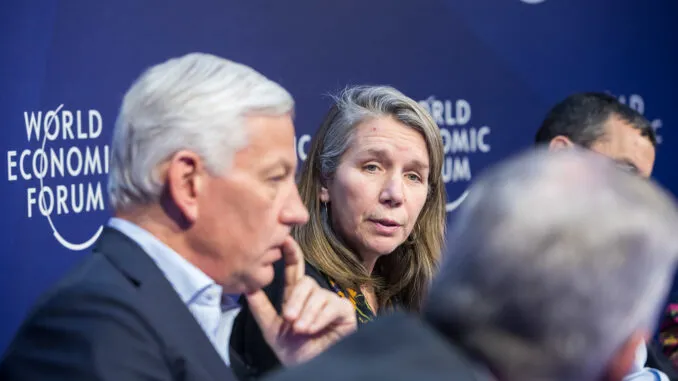-
WEF Suggests ‘Hardcore Censorship’ As Means of Restoring Public Trust In Global Elite

The people of the world are rejecting the globalist agenda because they have too much information at their disposal, according to the World Economic Forum which has ordered world governments to engage in “hardcore censorship” as a means of restoring public trust in the global elite.
Jeanne Bourgault, the president and CEO of Internews, an international nonprofit that provides “support” to media outlets in more than 100 countries, addressed how to prevent the spread of anti-globalist information during a Davos conference panel titled “Defending Truth.”
“Global trust in institutions is eroding, reflected in how 40% of people consistently trust news. Empowering internet users with media information literacy, advancing information integrity and enhancing transparency are vital for addressing the spread of false information,” read the WEF’s description of the Thursday session.
Panelists, including Bourgault, sought to answer the question, “What actions do stakeholders need to take to preserve a healthy trust ecosystem?”
The Blaze report: Bourgault explained that one of the most effective ways to keep people from being exposed to so-called inaccurate information is to develop lists or guides for advertisers that tell them where to and where not to spend.
“Disinformation makes money, and we need to follow that money, and we need to work with, in particular, the global advertising industry,” Bourgault said. “A lot of those dollars go to pretty bad content. So you can work really hard on exclusion lists or inclusion lists just to really try to … focus their ad dollars toward the good news and information. The accurate and relevant news and information.”
Bourgault expressed frustration that social media platforms do not employ enough “trust and safety people” to monitor and remove “disinformation” shared on their platforms.
According to Internews’ website, the nonprofit seeks to help people worldwide gain access to “trustworthy news and information to make informed decisions about their lives and hold power to account.”
“We train journalists and digital rights activists, tackle disinformation, and offer business expertise to help media outlets become financially sustainable,” the website states.
The organization aims to eliminate “disinformation designed to manipulate elections, distort public debate, incite violence or undermine public health.” Internews also mentions the need to hold social media platforms responsible for ensuring “quality information” shared online is “prioritized” while “disinformation is removed.”
Fellow panelist Vera Jourová, vice president for values and transparency at the European Commission, claimed that disinformation presents a challenge to enhancing global security and cooperation.
“Disinformation is a security threat. And maybe not many noticed, but it was part of the Russian military doctrine that they will start information war. And we are in it now,” Jouravá stated. “How we think about it in the [European Union]: We are focusing on improving of the system where the people will get the facts right.”
Jouravá claimed that the EU is not trying to censor opinions or language. As far as what steps the EU is taking to prevent the spread of false information, she noted that social media companies are now forced by law to remove disinformation.
She added that the “last resort solution” to solve the issue of so-called inaccurate information is “law enforcement.” Jouravá pointed to the increase in anti-Semitism and noted that disinformation shared online could lead to physical threats.



Login or Register to Leave a Comment